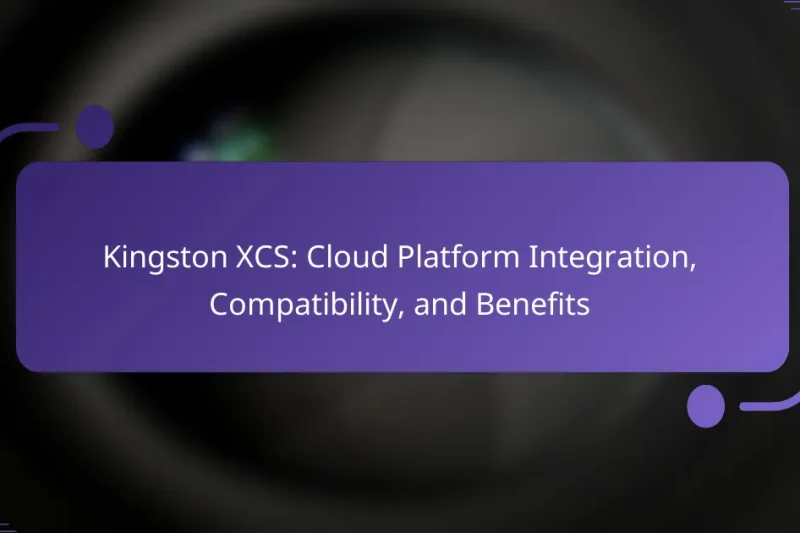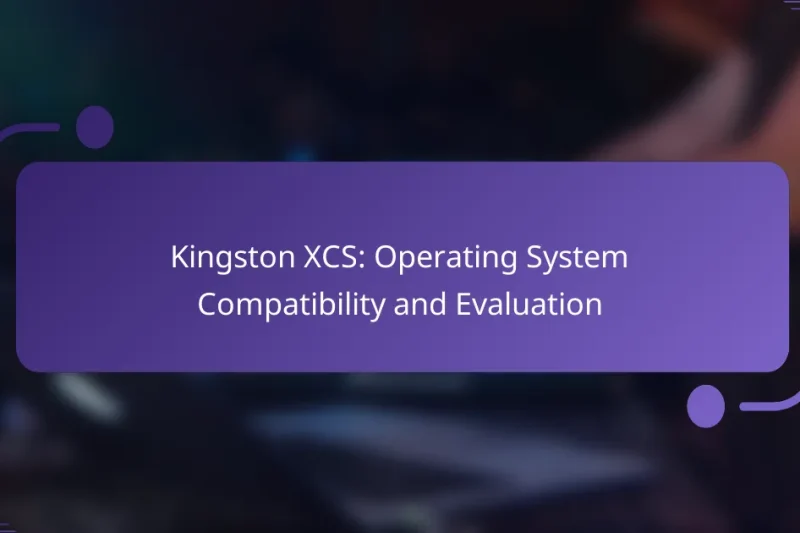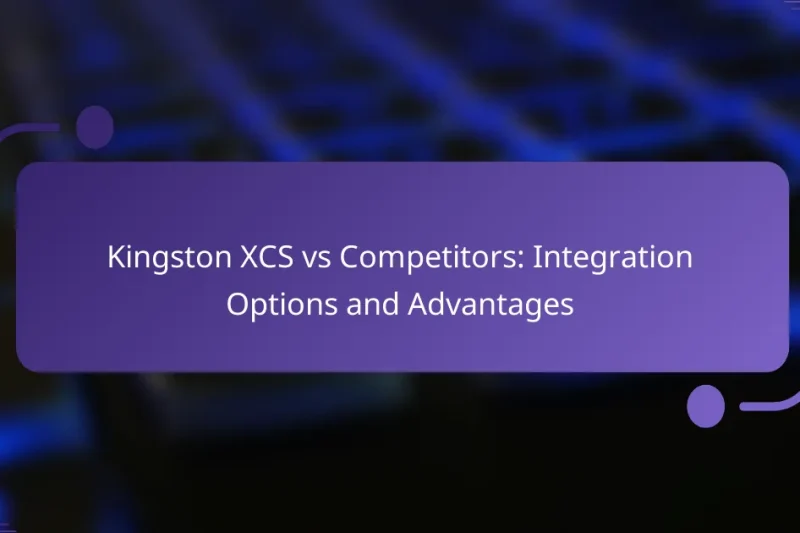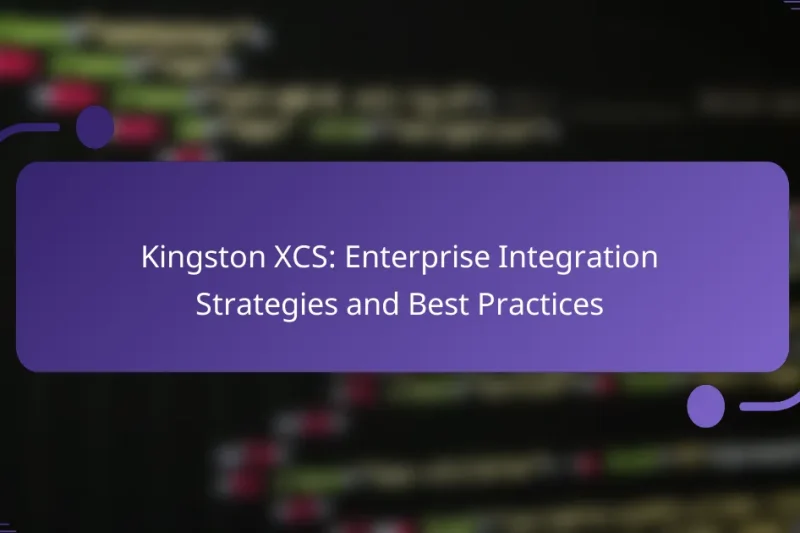Kingston XCS provides robust integration options that enable seamless connectivity with existing systems and third-party services, … Kingston XCS: Cloud Platform Integration, Compatibility, and BenefitsRead more
Kingston XCS Data Solutions: Integration Capabilities
Kingston XCS provides advanced integration capabilities that significantly improve data management and streamline workflows across diverse platforms. With features such as data synchronization with cloud services and real-time analytics, organizations can automate processes and maintain data integrity, ultimately enhancing efficiency and reducing costs.
Kingston XCS: IT Infrastructure Setup and User Guidance
Setting up the Kingston XCS IT infrastructure requires careful planning and adherence to best practices, including … Kingston XCS: IT Infrastructure Setup and User GuidanceRead more
Kingston XCS: Operating System Compatibility and Evaluation
The Kingston XCS is designed to work seamlessly with multiple operating systems, including Windows, macOS, and … Kingston XCS: Operating System Compatibility and EvaluationRead more
Kingston XCS vs Competitors: Integration Options and Advantages
Kingston XCS distinguishes itself in the competitive landscape by offering a range of integration options that … Kingston XCS vs Competitors: Integration Options and AdvantagesRead more
Kingston XCS: Enterprise Integration Strategies and Best Practices
Kingston XCS provides robust enterprise integration strategies that utilize modern technologies to facilitate seamless data flow … Kingston XCS: Enterprise Integration Strategies and Best PracticesRead more
Kingston XCS: API Capabilities for Developers and Use Cases
The Kingston XCS offers robust API capabilities that empower developers to efficiently manage data, integrate with … Kingston XCS: API Capabilities for Developers and Use CasesRead more
Kingston XCS: Successful Industry Integrations and Case Studies
Kingston XCS has effectively integrated into diverse industries by delivering reliable storage solutions that improve data … Kingston XCS: Successful Industry Integrations and Case StudiesRead more
What integration capabilities does Kingston XCS offer?
Kingston XCS provides robust integration capabilities that enhance data management and streamline workflows across various platforms. Its features include data synchronization with cloud services, real-time analytics integration, API support for third-party applications, and seamless integration with enterprise systems.
Data synchronization with cloud services
Kingston XCS enables efficient data synchronization with popular cloud services, ensuring that data remains consistent across multiple platforms. This capability allows organizations to automatically update and back up their data in real-time, reducing the risk of data loss.
For effective synchronization, users should consider the frequency of updates and the volume of data being transferred. Utilizing incremental updates can minimize bandwidth usage and improve performance.
Real-time analytics integration
The platform supports real-time analytics integration, allowing businesses to analyze data as it is generated. This feature is crucial for making timely decisions based on current data trends and patterns.
To leverage this capability, organizations should implement monitoring tools that can process and visualize data quickly. Ensuring that the analytics tools are compatible with Kingston XCS will enhance the overall effectiveness of data-driven strategies.
API support for third-party applications
Kingston XCS offers robust API support, enabling seamless connections with various third-party applications. This flexibility allows businesses to customize their data workflows and integrate with existing software solutions.
When using APIs, it is essential to review the documentation for compatibility and security protocols. Proper authentication methods should be implemented to protect sensitive data during integration.
Seamless integration with enterprise systems
Kingston XCS is designed for seamless integration with enterprise systems, facilitating smooth data exchange between different business applications. This capability helps streamline operations and improve overall efficiency.
Organizations should assess their existing systems and identify key integration points. Regular testing and updates can help maintain compatibility and performance as enterprise systems evolve.
How does Kingston XCS enhance data management?
Kingston XCS enhances data management by streamlining processes, improving accessibility, and ensuring data integrity. Its integration capabilities allow organizations to automate workflows, centralize data storage, and maintain high levels of accuracy and consistency across their datasets.
Automated data workflows
Automated data workflows in Kingston XCS reduce manual intervention, speeding up data processing and minimizing errors. By setting up triggers and actions, users can automate tasks such as data entry, reporting, and notifications, which can save significant time and resources.
For example, a business can configure the system to automatically update inventory levels when sales are made, ensuring real-time data availability. This not only enhances efficiency but also allows teams to focus on strategic tasks rather than repetitive manual processes.
Centralized data repository
The centralized data repository feature of Kingston XCS consolidates data from various sources into a single location, making it easier to access and manage. This approach eliminates data silos and ensures that all stakeholders have access to the same information, fostering collaboration and informed decision-making.
Organizations can benefit from reduced data duplication and improved security, as centralized systems often have better controls and monitoring capabilities. This setup is particularly useful for companies operating in regulated industries, where compliance with data governance standards is crucial.
Improved data accuracy and consistency
Kingston XCS enhances data accuracy and consistency by implementing validation rules and automated checks. These features help identify discrepancies and ensure that only high-quality data is used for analysis and reporting.
For instance, businesses can set rules to flag any data entries that do not meet predefined criteria, allowing for quick corrections. This proactive approach not only improves the reliability of insights drawn from the data but also builds trust among users relying on that information for critical decisions.
What are the benefits of using Kingston XCS for businesses?
Kingston XCS offers several advantages for businesses, including enhanced data management and integration capabilities that lead to improved efficiency and cost-effectiveness. By leveraging these solutions, organizations can optimize their operations and better meet their growing data demands.
Increased operational efficiency
Using Kingston XCS can significantly boost operational efficiency by automating data workflows and reducing manual tasks. This integration allows for seamless data transfer between systems, minimizing delays and errors that often occur in traditional processes.
For example, businesses can expect to see faster data retrieval times and improved accuracy in reporting, which can lead to quicker decision-making. Implementing these solutions can streamline operations, allowing teams to focus on strategic initiatives rather than routine data management.
Cost savings through streamlined processes
Streamlined processes facilitated by Kingston XCS can lead to substantial cost savings for businesses. By reducing the time and resources spent on data handling, organizations can allocate their budgets more effectively, ultimately improving their bottom line.
Companies often find that automating repetitive tasks can save tens of thousands of dollars annually, depending on the scale of operations. Additionally, fewer errors mean less money spent on corrections and compliance issues, further enhancing financial efficiency.
Scalability for growing data needs
Kingston XCS provides scalable solutions that adapt to the evolving data needs of businesses. As organizations grow, their data requirements often expand, and having a flexible integration system ensures that they can manage increased volumes without significant overhauls.
This scalability means that businesses can start with a solution that fits their current needs and expand as necessary, avoiding costly migrations or system replacements. Companies should consider their future data growth when implementing Kingston XCS to ensure they are well-prepared for upcoming challenges.
What industries benefit from Kingston XCS integration?
Kingston XCS integration capabilities are particularly beneficial for industries that require seamless data management and real-time access. Key sectors include healthcare, financial services, and retail, each leveraging these solutions to enhance operational efficiency and data accuracy.
Healthcare data management
In healthcare, Kingston XCS integration facilitates the secure exchange of patient information across various systems. This ensures that healthcare providers have access to accurate and up-to-date data, which is critical for patient care and compliance with regulations like HIPAA.
Implementing Kingston XCS can streamline processes such as electronic health record (EHR) management and billing systems. By integrating these systems, healthcare organizations can reduce administrative errors and improve patient outcomes.
Financial services integration
Financial services benefit from Kingston XCS integration by enhancing data accuracy and regulatory compliance. Institutions can integrate various platforms, including trading systems and customer relationship management (CRM) tools, to provide a unified view of client data.
This integration helps in real-time transaction processing and risk management, which are vital in maintaining competitive advantage. Financial organizations should consider the security measures in place to protect sensitive data during integration.
Retail inventory systems
In the retail sector, Kingston XCS integration optimizes inventory management by linking point-of-sale systems with inventory databases. This allows retailers to maintain accurate stock levels and reduce instances of overstocking or stockouts.
Retailers can also benefit from integrating e-commerce platforms with their inventory systems, enabling real-time updates on product availability. A well-implemented integration strategy can lead to improved customer satisfaction and increased sales.
What prerequisites are needed for Kingston XCS integration?
To successfully integrate Kingston XCS, organizations must assess their existing IT infrastructure and evaluate data quality. These prerequisites ensure that the integration process is seamless and that the data being utilized is accurate and reliable.
Existing IT infrastructure assessment
Assessing your existing IT infrastructure is crucial for Kingston XCS integration. This involves reviewing hardware, software, and network capabilities to ensure compatibility with the XCS system. Consider factors such as server capacity, network bandwidth, and existing data storage solutions.
Organizations should identify any potential gaps in their infrastructure that could hinder integration. For example, if current servers lack the processing power needed for XCS, upgrades may be necessary. A thorough assessment can help avoid costly disruptions during the integration process.
Data quality evaluation
Data quality evaluation is essential for effective Kingston XCS integration. This process involves checking for accuracy, completeness, and consistency of the data that will be integrated. Poor data quality can lead to errors and inefficiencies in the system.
Organizations should implement data cleansing techniques to address issues such as duplicate entries or outdated information. Regular audits and validation processes can help maintain high data quality standards, ensuring that the integrated system operates smoothly and delivers reliable insights.
How to choose the right integration solution?
Choosing the right integration solution involves assessing your specific business needs and ensuring compatibility with existing systems. A well-suited integration solution can streamline processes, enhance data flow, and improve overall efficiency.
Evaluate business needs and goals
Start by identifying the core objectives your integration solution must achieve. Consider factors such as data volume, user access requirements, and desired outcomes like improved reporting or enhanced customer experiences.
Engage stakeholders from various departments to gather insights on their needs. This collaborative approach helps ensure that the chosen solution aligns with both immediate and long-term business goals.
Consider compatibility with existing systems
Assess how well the integration solution will work with your current technology stack. Compatibility is crucial for minimizing disruptions and ensuring seamless data exchange between systems.
Check for support of common standards like RESTful APIs or SOAP, and evaluate whether the solution can easily connect with your existing software, such as CRM or ERP systems. Conducting a compatibility analysis can save time and resources in the long run.






